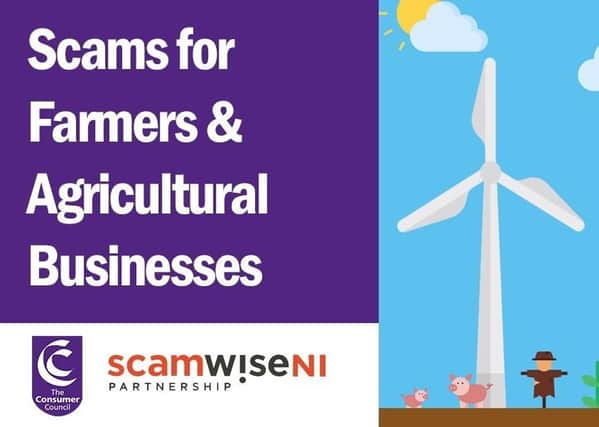10 common scams for farmers to watch out for


1. Invoice scams – This is where the farming community/businesses may receive an invoice to pay but scammers attempt to re-direct payments by posing as a legitimate supplier and often use company logos to make emails and invoices look genuine. Never send funds without verifying that the company is legitimate. If you have any doubts, contact the company on the official contact details listed on its website.
2. Investment scams – Scammers are tempting consumers to invest their money with an offer of high returns. This may be at particular times of the year when government support payments or subsidy payments are being provided to businesses working in rural communities. If you were contacted out of the blue then think – is it too good to be true? Bin it, delete it or hang up.
Advertisement
Advertisement
3. Tax rebate scams – Scammers are pretending to be HMRC offering a tax rebate, particularly during COVID-19. HMRC will never contact you via text message, email or social media offering a tax rebate.
4. Phone scams – Scammers use number spoofing to make the caller display show a seemingly legitimate phone number (for example, your bank, HMRC, TV License). If you are in doubt, hang up and call the company back on the official contact details listed on its website. This also applies to text messages.
5. Free government payment scams – Scammers often pretend to be from the government and offer free payments through fake websites or social media platforms. Never click on links unless you are sure of the source and always check that government website addresses are official by ensuring the URL ends with ‘.gov.uk’.
6. Online auction/bidding website scams – The private seller may message you and offer you additional discount if you pay directly into their bank account. In addition, be wary if the starting price is extremely low and not in line with current market prices. More often than not, the products are not delivered. Most importantly, never leave the online auction website when asked to make payment.
Advertisement
Advertisement
7. ‘Free ad’ locations within social media platforms and online auction websites – Often scammers post ads for goods that do not exist. Avoid sellers only wanting to converse by email/text message with a reluctance to engage by phone; sellers wanting money paid upfront and by bank transfers; offers to use ‘escrow services’ where they claim a third party service will hold the money until goods are inspected; and requests for ID documents.
8. Fake websites selling fake goods – Watch out for fake websites selling fake goods online. Always do your research before buying from a website you haven’t used before, including looking for reviews or previous customer feedback.
9. Social media scams – Scammers will offer farming machinery, equipment or supplies at very low prices on social media. Whilst the offer may seem genuine and the photographs look very professional, scammers can be highly skilled in web design to make these offers appear genuine. If you see an ad offering expensive items at a low price, stop and think – is this too good to be true?
10. Romance scams – This is where a person meets a scammer online who, over time convinces the person that they love them, even though they never meet face to face. The scammers will ask for money (often to pay off debts, for a sick relative or to pay for the airfare to visit). Scammers target social media platforms and this type of scam can last for months. Be careful if you receive messages from people you do not know and never click on links or enter payment details.
Advertisement
Advertisement
For more top tips and additional information on the different types of scams, download the ‘Scams for Farmers and Agricultural Businesses’ leaflet, which is available on the website: www.consumercouncil.org.uk. For additional information on scams, visit the nidirect website or the Scamwiseni Facebook page. To report scams to Action Fraud on 0300 123 2040 or the PSNI on 101.